Webinar Participants
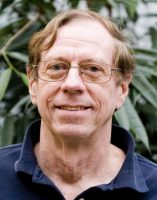
Arthur Dahl
Marine environmental scientist Dr. Arthur Lyon Dahl is President of the International Environment Forum and a retired senior official of the United Nations Environment Programme. He was the environmental advisor to all the Pacific Island countries for a decade, organized the Pacific Regional Environment Programme (SPREP), and has co-authored papers on Pacific indigenous values and deep sea mining. He collaborates closely with the Baha’i International Community and chairs the Religion and Environment Working Group of the G20 Interfaith Forum. His recent focus is on improving global environmental governance.
“The deep connection to nature of the Oceanian peoples extends to areas proposed for deep sea mining where profit takes priority over culture and values.”
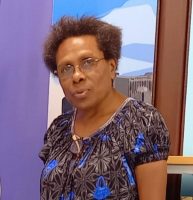
Rosa Koian
Rosa Koian is a Papua New Guinean journalist. For many years now she has been advocating for social and environmental justice.
“Once the takers used to dig in the backyard. For seabed mining in Papua New Guinea they will be digging in the house.”
“In the last project PNG lost more than K375m (USD106.5m). The Prime Minister James Marape described this project as a total failure.”
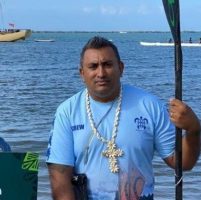
Rev. James Bhagwan
Married to Maelin Pickering (who. has maternal links to Kiribati, Samoa and Fiji) and father to Francisco and Antonia, Rev. James Bhagwan currently the General Secretary of the Pacific Conference of Churches, which is comprised of 33 Churches and 10 National Councils of Churches across 19 Pacific Island states and territories.
He is an ordained minister of the Methodist Church in Fiji.
A former award winning producer and radio/tv host, he holds a Bachelor of Divinity with Honours from the Pacific Theological College in Suva, Fiji and Masters of Theology in Christian Social Ethics from the Methodist Theological University in Seoul, South Korea.
He is involved in social justice issues and ocean health. He is a Board Member for Pacific Women Lead, and is one of the Trustees for the Pacific Disability Forum and the Fijian traditional voyaging society, the Uto Ni Yalo Trust.
“Deepsea mining is the latest in a long list of destructive industries to be thrust into our sacred ocean. It is a new, perilous frontier extractive industry being falsely promoted as a proven answer to our economic needs. While its promised benefits remain speculative, its pursuit is insidious. Even at an experimental stage, deep seamining (DSM) is already proving harmful to Pacific communities, their livelihoods, cultural practices, and their wellbeing.”
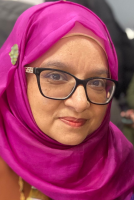
Dr. Husna Ahmad OBE
Dr Husna Ahmad OBE is the CEO of Global One 2015 which is a faith based International NGO focused on women.
With a PhD in International Environmental Law from the School of Oriental and African Studies, [SOAS] London University, and an honorary fellow of the Edward Cadbury Centre for the Public understanding of Religion, Birmingham University. She is currently a Board member of Faith for the Climate and Palmers Green Mosque (the MCEC). She is also a member of the Women’s Faith Forum UK; and Executive committee member of Barnet Faith Forum.
She sits on the Environment Working group of the IF20. She is a member of the Multi faith Advisory Council [MFAC] to the UN Inter-agency Task Force on Religion and Development. Dr Ahmad sits on the Steering Committee of The World Bank’s Moral Imperative Initiative.
She is an author and thought leader who has presented many papers internationally focusing particularly on faith and the environment.
She is the Secretary General of the World Muslim Leadership Forum and the Coordinator for the Alliance of NGOs and CSOs for South-South Cooperation [ ANSSC] which works in collaboration with the UN office of South South Cooperation.
She was appointed an Officer of the Order of the British Empire (OBE) in the New Year’s Honours list in 2010 for her services to disadvantaged people for work promoting social justice with disadvantaged communities.
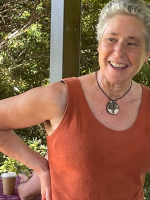
Dr. Helen Rosenbaum
Dr. Helen Rosenbaum is co-founder of the Deep Sea Mining Campaign. Helen holds a doctorate in Medical Science, has worked as a marine toxicologist and in the development of coastal management policy. She also has 30 years’ experience in environmental and human rights advocacy and in community development. Over the past 12 years the DSM Campaign has worked in solidarity with civil society organisations, scientists and citizens around the world who are concerned about the likely impacts of deep sea mining on ecosystems and island and coastal communities. The DSM Campaign has also produced many science based reports, fact sheets and resource materials. Released last year the video, Blue Peril continues this strong commitment to science based advocacy. It presents for the first time the results of modelling showing the spread of pollution and the extent of seafloor destruction for actual licence areas held by The Metals Company in the Pacific Ocean.